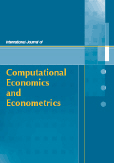
International Journal of Computational Economics and Econometrics
Scope & Guideline
Exploring the intersection of technology and economic theory.
Introduction
Aims and Scopes
- Computational Economics:
The journal focuses on applying computational methods to solve economic problems, allowing for the analysis of complex systems and behaviors that traditional methods may not adequately address. - Econometric Modeling:
A significant emphasis is placed on econometric techniques, including time series analysis, panel data methods, and structural equation modeling, to evaluate economic theories and real-world data. - Interdisciplinary Approaches:
The journal encourages interdisciplinary research that combines economics with fields such as machine learning, data science, and health economics, reflecting the diverse applications of computational methods. - Policy Analysis and Implications:
Research often explores the implications of economic policies, particularly in areas like fiscal and monetary policies, public health, and labor markets, providing valuable insights for policymakers. - Empirical Studies:
The journal publishes empirical studies that utilize advanced statistical methods to derive conclusions from economic data, emphasizing the importance of evidence-based research.
Trending and Emerging
- Machine Learning Applications:
There is a significant increase in the application of machine learning techniques for economic forecasting and risk analysis, indicating a shift towards data-driven methodologies that enhance predictive accuracy. - Health Economics:
Recent publications have highlighted the intersection of health and economics, particularly in the context of public health crises such as COVID-19, showcasing the relevance of economic analysis in health policy. - Agent-Based Modeling:
The use of agent-based models to analyze macroeconomic phenomena is gaining popularity, reflecting a trend towards simulating complex interactions within economic systems. - Dynamic General Equilibrium Models:
Emerging themes include the use of dynamic computable general equilibrium models to analyze policy impacts, demonstrating a growing interest in comprehensive modeling of economic systems. - Behavioral Economics:
Research focusing on behavioral aspects of economic decision-making, including herding behavior in financial markets, is on the rise, highlighting the importance of psychological factors in economic analysis.
Declining or Waning
- Traditional Economic Theories:
There has been a noticeable decline in papers focusing solely on classical economic theories without computational enhancement, as the journal shifts towards more innovative and computationally driven approaches. - Basic Statistical Techniques:
Research employing rudimentary statistical methods has decreased, with a stronger preference for advanced econometric methods and machine learning techniques that provide deeper insights. - Sector-Specific Studies:
While sector-specific analyses were once prevalent, the journal's recent publications indicate a trend towards broader economic analyses and systemic approaches rather than isolated sector studies. - Qualitative Research:
There is a waning interest in purely qualitative research within the journal, as the focus has shifted more towards quantitative analyses that leverage computational techniques. - Local Economic Studies:
The journal seems to be moving away from localized economic studies, favoring global or comparative analyses that consider wider economic implications.
Similar Journals
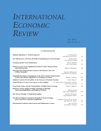
INTERNATIONAL ECONOMIC REVIEW
Advancing economic discourse for a changing world.INTERNATIONAL ECONOMIC REVIEW is a prestigious journal dedicated to advancing knowledge in the fields of economics and econometrics. Published by Wiley in the United Kingdom, this journal boasts an impressive Q1 ranking in the 2023 category of Economics and Econometrics, reflecting its significant impact in the academic community. With a continued publication since its inception in 1979, it offers a platform for rigorous scholarly articles that address contemporary issues, theoretical developments, and empirical findings in economics. Although it does not currently offer open access options, the journal maintains broad accessibility through institutional subscriptions. Researchers, professionals, and students are encouraged to contribute to and engage with this leading publication to foster knowledge exchange and stimulate scholarly dialogue in economic research. With its commitment to high-quality scholarship, the INTERNATIONAL ECONOMIC REVIEW remains a vital resource for developing insights that inform both policy and practice.

Thailand Statistician
Empowering Research Through Innovative Statistical InsightsThailand Statistician, published by the THAI STATISTICAL ASSOCIATION, is a pivotal journal in the realms of computational mathematics and statistics. With an ISSN of 1685-9057 and an E-ISSN of 2351-0676, this journal aims to disseminate high-quality research and innovative methodologies that advance the fields of statistics and probability. Covering a range of topics from theoretical statistics to applied computational techniques, it provides a platform for researchers, professionals, and students in Thailand and beyond to contribute their findings and insights. The journal has been gaining recognition, boasting a Scopus ranking of Q3 in Computational Mathematics and Q4 in Statistics and Probability as of 2023. With its commitment to open access, the Thailand Statistician stands as an essential resource for those striving to stay abreast of advancements in statistical methodologies and their applications, fostering the growth of statistical science in the region and globally.
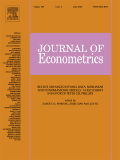
Journal of Econometrics
Driving Excellence in Econometric Scholarship Since 1973.Journal of Econometrics, published by ELSEVIER SCIENCE SA, is a leading journal in the fields of applied mathematics and econometrics, with a commendable reputation established since its inception in 1973. The journal's ISSN 0304-4076 and E-ISSN 1872-6895, reflect its commitment to quality research output, and it enjoys a high impact factor, ranking in the Q1 category for economics and applied mathematics as per the latest 2023 assessments. The journal aims to provide rigorous theoretical developments, empirical analyses, and methodologies in the rapidly evolving discipline of econometrics, thus catering to a diverse audience of researchers, professionals, and students alike. While currently not offered in an open access format, the quality and depth of research articles published within its pages make it a vital resource for anyone interested in the quantitative analysis of economic data. With a strong ranking in Scopus, particularly in the 96th percentile for applied mathematics, Journal of Econometrics continues to be at the forefront of academic inquiry, fostering advancements in both theory and practice within the global economy.
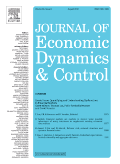
JOURNAL OF ECONOMIC DYNAMICS & CONTROL
Driving Progress in Economic Dynamics through Rigorous ScholarshipJOURNAL OF ECONOMIC DYNAMICS & CONTROL, published by Elsevier, is a distinguished scholarly journal that has established itself as a leading outlet in the fields of applied mathematics, control and optimization, and economics and econometrics since its inception in 1979. With its notable Q1 categorization in 2023 across these disciplines, this journal provides a platform for innovative research that propels theory and practice in dynamic systems and control processes. Researchers, professionals, and students can engage with cutting-edge studies that explore complex economic models and their real-world applications. Although the journal does not offer open access, it remains a vital resource for those aiming to stay informed of the latest advancements in economic dynamics and control methodologies. The journal’s commitment to high-quality research and its impressive standing—ranked in the top percentiles within Scopus categories—underscore its importance and influence within the academic community.
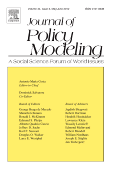
JOURNAL OF POLICY MODELING
Unlocking the Power of Data for Effective Policy SolutionsJOURNAL OF POLICY MODELING, published by Elsevier Science Inc, is a leading forum for theoretical and applied research in the fields of policy analysis and economic modeling. With an impressive impact factor and classified in the Q1 category of Economics and Econometrics, this journal ranks in the top 82nd percentile among peers in its field, reflecting its significant contributions to academic discourse and practical policy applications. Established in 1979, it offers a robust collection of research spanning through 2024, making it a vital resource for scholars, policymakers, and practitioners seeking to understand complex economic and social issues. The journal aims to foster innovative modeling techniques and empirical studies that inform policy decision-making, thus playing a crucial role in advancing knowledge and facilitating informed debate in economics and related disciplines. Access options for the journal include subscription-based formats, ensuring wide availability while maintaining high-quality peer review standards.

JOURNAL OF QUANTITATIVE ECONOMICS
Advancing Economic Insight Through Quantitative AnalysisJOURNAL OF QUANTITATIVE ECONOMICS, published by SPRINGER, is an influential academic journal focusing on significant quantitative methodologies in the field of economics. With its ISSN 0971-1554 and E-ISSN 2364-1045, the journal aims to deliver high-quality research that explores theoretical and empirical applications in economics and related disciplines. Operating from Switzerland, this journal has gained recognition for its contributions, achieving a position in the Q3 quartile for Business and International Management, Development, and other related categories in 2023. While it does not currently offer open access, it is accessible through various libraries and institutions for scholars interested in advancing their understanding of quantitative economic analysis. By fostering a dynamic dialogue among researchers and practitioners, the JOURNAL OF QUANTITATIVE ECONOMICS plays a crucial role in shaping insights and driving innovation within the economic landscape today.
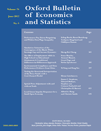
OXFORD BULLETIN OF ECONOMICS AND STATISTICS
Exploring the nexus of economics and statistics.The Oxford Bulletin of Economics and Statistics, published by Wiley, stands as a leading journal in the realms of Economics, Econometrics, and Statistics. Since its inception in 1973 and converging through to 2024, the journal has consistently positioned itself in the top quartile (Q1) across multiple categories, including Economics and Econometrics, Social Sciences, and Statistics and Probability, highlighting its influential status in the academic community. With a commendable ranking within Scopus, notably ranked #53 in Social Sciences and #28 in Statistics and Probability, it serves as a critical platform for disseminating rigorous research and innovative methodologies. Researchers, professionals, and students are encouraged to contribute and engage with the high-quality content that defines this esteemed journal, which does not currently offer Open Access but remains a pivotal resource for those seeking to deepen their understanding of economic and statistical paradigms in the pressing global landscape.
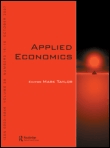
APPLIED ECONOMICS
Empowering Economists to Tackle Real-World ChallengesApplied Economics, published by Routledge Journals, Taylor & Francis Ltd, is a revered platform in the field of Economics and Econometrics. Since its inception in 1969, the journal has maintained its commitment to disseminating high-quality research, covering a wide range of topics within applied economics that are critical for understanding and addressing real-world economic issues. With a notable Q2 ranking in Economics and Econometrics and a strong standing in the 67th percentile of Scopus rankings, it serves as an essential resource for researchers, professionals, and students alike, providing insights that bridge theoretical frameworks and practical applications. While the journal is not an Open Access platform, it continues to foster academic discourse and innovation within the economics community, contributing to the ongoing development of evidence-based policies and practices. Its accessibility and robust editorial standards ensure that the latest findings and methodologies reach an engaged audience, further solidifying its reputation as a key publication in the field.

Quantitative Economics
Exploring the depths of quantitative methods in economic theory.Quantitative Economics is a leading open-access journal published by WILEY, dedicated to advancing the field of economics through rigorous quantitative analysis. Established in 2010 and based in the United States, this influential journal boasts an impressive Q1 rating in the 2023 category of Economics and Econometrics, reflecting its high impact and quality within the field. With a Scopus ranking of #222 out of 716 in the Economics and Econometrics category, it sits comfortably in the 68th percentile, underscoring its relevance to researchers and professionals alike. The journal accepts a wide range of submissions, including original research articles, methodological advancements, and comprehensive reviews, which contribute to the understanding and application of quantitative methods in economic research. By providing immediate open access to all published articles, Quantitative Economics ensures that vital findings are readily available to academics, policymakers, and students across the globe, enhancing collaboration and innovation within the discipline.
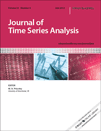
JOURNAL OF TIME SERIES ANALYSIS
Transforming time series data into actionable knowledge.JOURNAL OF TIME SERIES ANALYSIS, published by Wiley, is a premier academic journal dedicated to the field of time series analysis, serving as a pivotal resource for researchers, professionals, and students in applied mathematics and statistics. With a strong commitment to advancing scholarly knowledge since its inception in 1980, the journal focuses on innovative methodologies and applications in time series data, highlighting its relevance in various domains, including economics, finance, and environmental studies. Although the journal currently does not offer open access, it maintains a robust reputation, reflected in its 2023 Q1 and Q2 quartile rankings in applied mathematics and statistics, respectively. The contributions published in this journal are instrumental for advancing theoretical frameworks and practical applications in data analysis. Stay informed of cutting-edge research and methodologies by engaging with the JOURNAL OF TIME SERIES ANALYSIS, which is accessible through various academic databases.